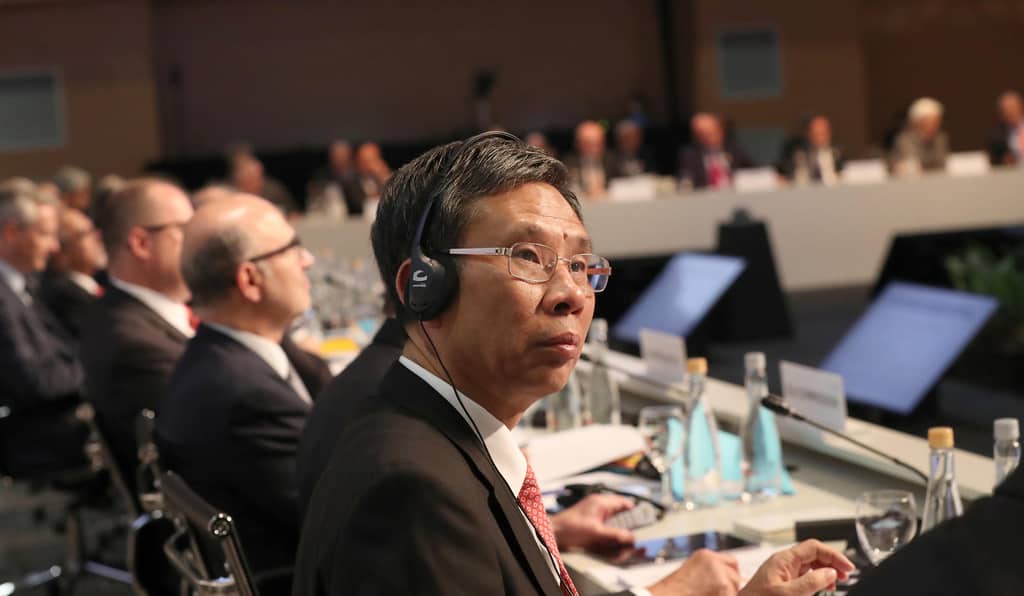The Chinese finance minister has flagged the use of greater stimulus measures to help deal with the economic fallout of the COVID-19 pandemic.
In an essay written for the People’s Daily – the Chinese Communist Party’s flagship newspaper, Chinese finance minister Liu Kun (刘昆) said that “active fiscal policy is at present an objective necessity for economic and social development.”
“Active fiscal policy becoming more active is the pragmatic need for countering downwards economic pressure,” said Liu in the essay entitled “Active Fiscal Policy Needs to Be More Active” (积极的财政政策要更加积极有为).
“At present China’s economic and social development continues to face considerable instability, and downwards economic pressure is still expanding.
“Appropriate increases in the deficit ratio, the issuance of special government bonds for combating (COVID-19), increases in the scale of special government bond issuance and stabilisation and expansion of the tax and fee reductions will be of benefit to driving supply-side structural reforms, unearthing internal demand potential, stimulating market vitality, and cultivating endogenous drivers.
“[This] will effectively address short-term shocks and challenges that arise during the operation of the economy.”
Liu highlighted key “contents” of more active fiscal policy as including:
- Use of “addition” in the form of i) increases in the deficit to clearly send positive signals; ii) implementation of reductions in taxes and fees to counter the business difficulties of enterprises; iii) expansion in government investment to offset downwards economic pressure, via COVID-19 sovereign bonds and special government bonds; iv) expanding transfer payments; v) strengthening budget balancing to offset the reduction in revenues resulting from COVID-19.
- Effective use of “multiplication” – upholding the principle of “increasing quality and efficiency,” and further optimising the usage structure and method for fiscal funds, focusing on improving living standards and joint benefit to supply and demand.
- Effective use of “subtraction” – great economisation of government expenditures, and strict control various forms of standard expenditures. Local fiscal departments must continue to put pressure on the “three public” expenditures, and strictly control expenses for meetings and travel.
- Effective use of “division” – firmly prevent and dissolve hidden risk hazards in relation to government debt. Improve local government bond normalisation monitoring measures, strengthen accountability, and appropriately dispose of risk involving regional high-risk financial institutions.
Concrete measures for active fiscal policy in China will include:
- Supporting micro, small and. medium-sized enterprises and industries facing difficulty as a result of the impacts of COVID-19;
- Making employment the “priority of priorities,” and using “myriad stratagems” to stabilise and expand employment. “Employment is the root of living standards, and employment prioritisation standards require comprehensive strengthening.” This will involve i) raising and effectively using employment subsidy funds; ii) strong support for tertiary graduates, rural workers and retired servicemen; iii) strengthening basic living guarantees and reemployment services for the unemployed.
- Supporting innovation development and industrial upgrade, stabilising foreign investment and trade, and ensuring that industry supply chains remain stable;
- Supporting and thoroughly implementing strategies for the invigoration of rural areas;
- Providing fiscal guarantees to poverty alleviation, and further guaranteeing and improving living standards;
- Expanding support for local government finances.
Related stories
China’s GDP Contracts 6.8% in First Quarter as COVID-19 Lockdown Hits Economy
NDRC Outlines China’s Policy Response to Impact of Coronavirus on the Economy




